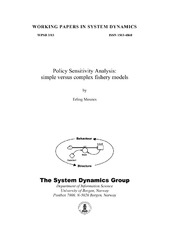Policy Sensitivity Analysis: simple versus complex fishery models
Working paper
Permanent lenke
https://hdl.handle.net/1956/1977Utgivelsesdato
2003Metadata
Vis full innførselSamlinger
- Department of Geography [634]
Sammendrag
Sensitivity analysis is often used to judge the sensitivity of model behaviour touncertain assumptions about model formulations and parameter values. Since theultimate goal of modelling is typically policy recommendation, one may suspect that itis even more useful to test the sensitivity of policy recommendations. A major reasonfor this is that behaviour sensitivity is not necessarily a reliable predictor of policysensitivity. Policy sensitivity analysis is greatly simplified if one can find optimalpolicies. Then one can simply see how the optimal policy changes when the modelassumptions are altered. Our case is a fishery model. We investigate how (near-to)optimal policies change when we correct for a typical estimation bias in an aggregatemodel, when we substitute the aggregate model with a cohort representation of thesame fishery, and when we switch from assuming variable to assuming constant fishprices and per unit variable costs. Normally these assumptions follow from theanalyst’s school of thought without testing. The most surprising result is that whileassumptions about the fish price and the per unit variable costs matter a lot, the choicebetween an aggregate and a cohort model is of little importance.
Utgiver
The University of BergenSerie
3/2003Working Papers in System Dynamics
